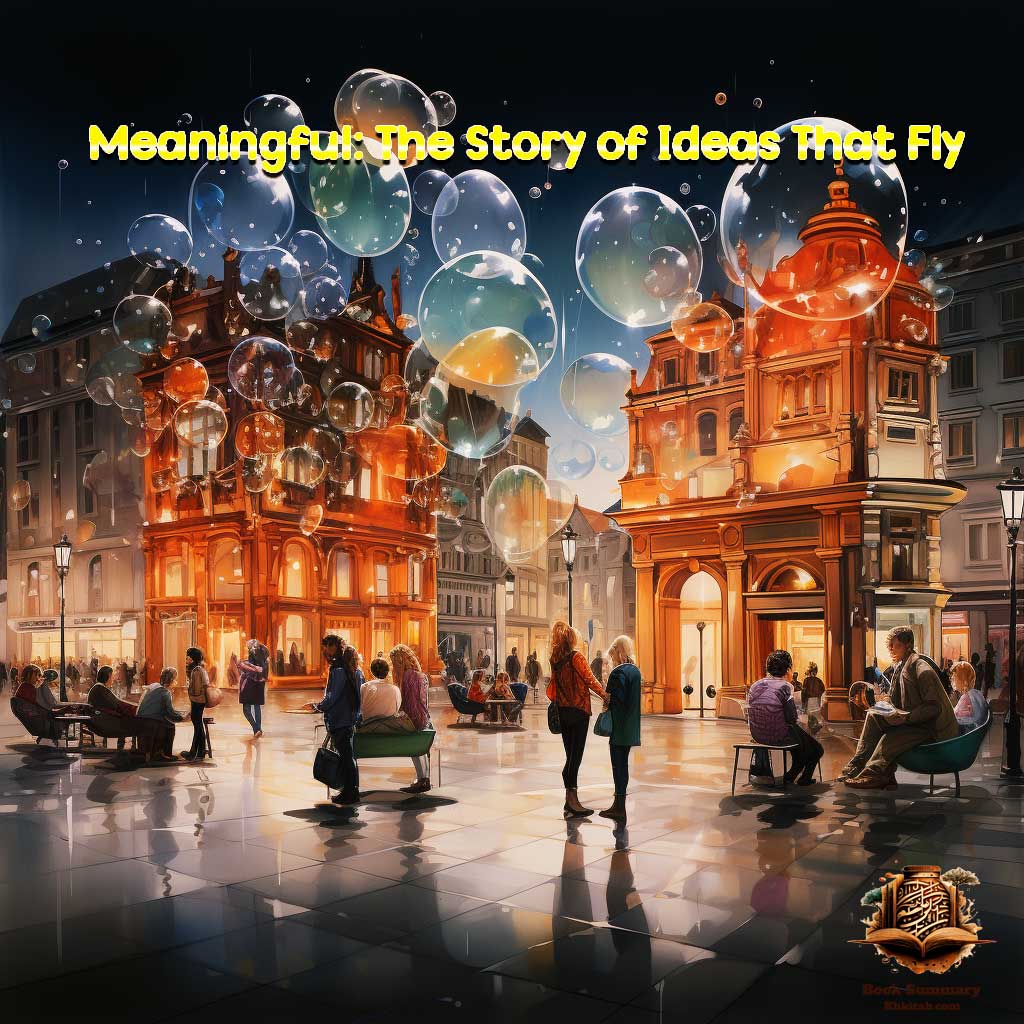
“Meaningful: The Story of Ideas That Fly” by Bernadette Jiwa is more than just a conventional marketing book. Instead, it takes the reader on an intellectual journey through the ideas that soar in the skies of excellence and success. In our modern world saturated with products and services, many find it challenging to stand out and make their ideas shine. Yet, there are some ideas that seemingly fly above the rest. What’s the secret behind these soaring concepts? That’s the question this book endeavors to answer.
Jiwa emphasizes the critical role of narrative and storytelling in creating a successful brand or a breakout product. It’s not enough to have an exceptional product; one must be capable of weaving a tale that deeply connects with consumers. This is what imbues a product or brand with meaning and value.
“Meaningful: The Story of Ideas That Fly” serves as a guide for anyone looking for ways to make their ideas take flight and stand out in a crowded marketplace. It offers the tools and strategies needed to craft a potent and resonant story, ensuring your product or service becomes unforgettable.
How Does Storytelling Shape Consumer Decisions in “Meaningful: The Story of Ideas That Fly”?
In “Meaningful: The Story of Ideas That Fly,” one of the standout concepts Bernadette Jiwa delves into is the unparalleled power of storytelling. As digital landscapes become increasingly cluttered and consumers are bombarded with countless messages daily, the age-old art of storytelling emerges as a beacon for genuine connection. But why is this the case?
Storytelling is an intrinsic part of human culture. From ancient civilizations around campfires to modern audiences in front of screens, stories have always been our primary vehicle for conveying emotions, values, and lessons. Jiwa emphasizes that in the context of modern marketing and brand communication, stories aren’t just about relaying information; they’re about forging emotional bonds.
When brands weave compelling narratives around their products or services, they’re doing more than just promoting features or benefits. They’re tapping into the human psyche, evoking emotions, and instilling values. This emotional connection is what often drives consumer decisions. For instance, while one product might technically be superior to another, consumers might choose the latter because of a touching advertisement or a brand story that resonates with their personal experiences or aspirations.
Jiwa further elaborates that stories help simplify complex ideas, making them digestible and relatable. A well-crafted narrative can transform an abstract concept into something tangible, relatable, and most importantly, memorable. In a market where attention spans are fleeting, the brands that tell compelling stories are the ones that linger in the consumer’s mind.
In conclusion, “Meaningful: The Story of Ideas That Fly” underscores the significance of storytelling in today’s business landscape. It’s not merely about selling a product but about building a narrative that resonates, touches hearts, and influences decisions. In an era dominated by data and algorithms, Jiwa’s insights remind us of the timeless human elements that truly make ideas fly.
Our Facebook Page – Book Summary
Why Do Some Products Resonate Beyond Their Basic Functionality According to “Meaningful: The Story of Ideas That Fly”?
In “Meaningful: The Story of Ideas That Fly,” Bernadette Jiwa offers a profound exploration of the distinguishing factors between products that simply serve a function and those that resonate on a deeper, more meaningful level with their users.
At a foundational level, every product is designed to solve a problem or meet a specific need. This is their basic utility. However, not all products that fulfill their functional promises achieve success in the market. Jiwa argues that true product success lies beyond just utility. It’s about the intangible connections, the feelings evoked, and the narratives built around a product that makes it meaningful.
For instance, consider two water bottles. Both hold water, are leak-proof, and serve their primary function well. Yet, one might be preferred over the other because of its eco-friendly narrative, its association with a social cause, or perhaps an emotional marketing campaign that resonated with a particular group of consumers. This demonstrates that beyond just quenching thirst, the bottle has tapped into values, beliefs, and emotions that users hold dear.
Jiwa also dives deep into the psychology of consumers. In a world teeming with choices, consumers lean towards products that reflect their identity, support their personal narratives, or connect with them on a deeper emotional level. It’s these emotional and psychological connections that elevate a product from being merely functional to becoming an integral part of a consumer’s life.
Furthermore, the book suggests that businesses should not merely focus on enhancing the functional attributes of their products. Instead, they should invest in understanding their audience, their aspirations, and their values. By doing so, brands can craft narratives and experiences around their products that make them not just useful but truly meaningful.
In conclusion, “Meaningful: The Story of Ideas That Fly” illuminates the nuanced differences between products that stop at utility and those that transcend to become meaningful entities in the lives of their users. It’s a reminder for brands and creators to look beyond the tangible and dive into the deeper emotional and psychological realms of their audience.
Business & Finance Management – Book Summary (khkitab.com)
Why Is Consumer Empathy Crucial for Success According to “Meaningful: The Story of Ideas That Fly”?
Bernadette Jiwa’s “Meaningful: The Story of Ideas That Fly” delves deeply into the realm of consumer empathy, spotlighting its centrality in crafting resonant and impactful brand stories. The book posits that in the complex tapestry of marketing and brand-building, genuine empathy for consumers isn’t merely a strategy but rather a cornerstone.
At its essence, consumer empathy revolves around truly understanding and connecting with the desires, needs, and aspirations of the target audience. It goes beyond merely acknowledging their requirements and dives deeper into understanding their emotional landscapes, the challenges they face, the dreams they chase, and the values they hold dear.
In a world overflowing with products and services, what often differentiates a successful brand from others is its ability to show its consumers that it “gets” them. Jiwa suggests that when a brand can step into its consumers’ shoes, feel what they feel, and reflect those emotions back in their offerings or campaigns, it not only establishes trust but also creates a profound emotional bond.
Moreover, the book emphasizes that consumer empathy leads to more genuine and authentic brand stories. Rather than resorting to generic messaging, brands armed with insights drawn from true empathy can craft narratives that resonate on a personal level with their audience. These narratives are not only more engaging but are also more likely to be remembered and shared, amplifying their impact.
Jiwa also sheds light on the cascading effects of consumer empathy. By genuinely understanding and catering to the emotions and aspirations of consumers, brands can often anticipate market shifts, innovate effectively, and stay ahead of the curve.
In conclusion, “Meaningful: The Story of Ideas That Fly” showcases that true consumer empathy isn’t just about meeting market demands; it’s about deeply connecting with the hearts and minds of consumers. It’s this deep-rooted connection that makes brands memorable and sets them on the path to enduring success.
How Do Purpose-Driven Narratives Elevate Brands According to “Meaningful: The Story of Ideas That Fly”?
In “Meaningful: The Story of Ideas That Fly”, Bernadette Jiwa presents an insightful perspective on the evolution of branding. She emphasizes that modern consumers crave more than just products; they seek brands with purpose, ones that resonate with their values and beliefs.
A brand’s purpose goes beyond its functional offerings. While a product’s functionality or quality can attract consumers, it’s the deeper, value-driven narrative that fosters loyalty and emotional connection. Jiwa argues that when brands embed a purpose into their narrative, they transcend from being mere commercial entities to movements or ideologies that consumers can align with.
Consider the growing trend towards sustainable and ethical consumerism. Brands that not only adopt eco-friendly practices but also weave this commitment into their core narrative are seeing a surge in consumer support. It’s not just about selling eco-friendly products; it’s about selling a commitment to the planet. This purpose-driven approach doesn’t just resonate with consumers’ buying habits but also with their sense of identity and values.
The book also highlights that a brand’s purpose must be genuine. In an age of information, consumers are more informed and can easily differentiate between brands that genuinely uphold their proclaimed values and those that use it as a mere marketing ploy. Authenticity, therefore, is key. Brands need to live their purpose, reflecting it not just in marketing campaigns but in business decisions, operations, and company culture.
Furthermore, Jiwa’s insights suggest that purpose-driven brands often enjoy long-term success and resilience. In times of market volatility or competition, a strong brand purpose can act as an anchor, keeping consumers engaged and loyal.
In conclusion, “Meaningful: The Story of Ideas That Fly” underscores the shift from transactional branding to transformational branding. Brands that understand and harness the power of purpose-driven narratives not only achieve commercial success but also play a pivotal role in shaping societal values and driving change.
How Have Some Brands Successfully Forged Meaningful Connections with Their Audiences as Highlighted in “Meaningful: The Story of Ideas That Fly”?
Bernadette Jiwa’s “Meaningful: The Story of Ideas That Fly” offers a deep dive into the transformative power of meaningful brand stories and their potential impact on consumer relationships. Throughout the book, Jiwa underlines the significance of understanding the audience’s aspirations, desires, and emotional needs. A particularly insightful part of the book touches upon real-world examples, providing case studies of businesses that have exceptionally managed to cement their place in the hearts of their consumers.
One such exemplar is the brand “Apple.” Beyond just selling technological products, Apple has consistently promoted a narrative of innovation, challenging the status quo, and thinking differently. The brand doesn’t merely focus on the technical specifications of its products but emphasizes the experience and the change it brings to one’s life. Through this, Apple has not only captured market share but also the imagination and loyalty of its audience.
Another poignant example is “Airbnb.” Instead of merely positioning itself as a platform for accommodation bookings, Airbnb sells experiences and the idea of ‘belonging anywhere.’ The brand’s narrative revolves around connecting with local cultures, forming real human connections, and experiencing places like a local. Such a perspective has turned the company into more than just a travel service; it’s a movement advocating for a more connected and understanding world.
“Patagonia,” the outdoor clothing and gear company, offers yet another compelling case study. Rather than solely marketing the durability of its products, Patagonia has woven environmental responsibility and sustainability into its core brand story. Their campaigns often highlight conservation efforts and encourage consumers to buy only what they need. Such a genuine commitment to values resonates deeply with a segment of consumers who prioritize sustainability.
In essence, these brands, as detailed in “Meaningful: The Story of Ideas That Fly,” have successfully moved beyond the traditional boundaries of selling products or services. They have tapped into deeper human aspirations and emotions, forging not just a commercial connection, but a meaningful, value-based bond with their audiences. Jiwa’s exploration underscores the profound impact of such connections on brand longevity, loyalty, and overall market success.
How Does “Meaningful: The Story of Ideas That Fly” Advocate for Challenging Conventional Business Wisdom to Emphasize Genuine Human Connection?
Bernadette Jiwa’s “Meaningful: The Story of Ideas That Fly” is a provocative exploration into the world of brand narratives and the importance of forging genuine human connections in business. One of the book’s most profound arguments is the need to challenge conventional business wisdom, which often prioritizes metrics, sales figures, and traditional marketing over real, authentic human engagement.
Jiwa illustrates that in today’s rapidly evolving marketplace, consumers are becoming increasingly discerning. They are no longer just attracted to flashy advertising or big promotional claims; they’re looking for brands that resonate with their values, aspirations, and personal stories. This shift demands that businesses rethink their strategies and approach, placing a higher emphasis on understanding and connecting with their audience on a more profound, emotional level.
The book delves deep into examples of brands and businesses that have successfully pivoted away from traditional practices. These businesses have recognized the inefficacy of a one-size-fits-all approach. Instead, they’ve adopted a more tailored, human-centric model that prioritizes the unique needs, desires, and emotions of their audience.
Moreover, Jiwa sheds light on the dangers of being too entrenched in conventional practices. Clinging to old models without adaptation can lead to stagnation and ultimately, irrelevance in a competitive market. By being adaptable, open to change, and genuinely caring about the audience, businesses can foster deeper loyalty, trust, and advocacy among their consumers.
In conclusion, “Meaningful: The Story of Ideas That Fly” pushes readers to critically evaluate the status quo in business practices. Jiwa encourages businesses to shift their focus from merely selling products to building meaningful, lasting relationships with their audience. It’s a call to challenge, innovate, and prioritize genuine human connection in the realm of business.
How Does “Meaningful: The Story of Ideas That Fly” Emphasize the Importance of Innovation in Maintaining Relevance in Today’s Dynamic Market?
In “Meaningful: The Story of Ideas That Fly”, Bernadette Jiwa brings forth a compelling argument about the essence of innovation and its pivotal role in ensuring that brands remain relevant and resonate with their target audience in an ever-evolving market landscape.
Throughout the book, Jiwa delves into the distinction between brands that simply exist and those that truly thrive. The differentiating factor? Continuous innovation. But Jiwa’s perspective on innovation isn’t limited to just creating new products or introducing groundbreaking technologies. It’s about deeply understanding the changing desires, needs, and aspirations of the consumer and innovating in ways that genuinely cater to these shifts.
For instance, in a world increasingly driven by digital transformation, brands that stick to traditional models without adapting to the digital age quickly lose relevance. But those that evolve, that harness the power of data to gain insights, and that utilize digital platforms to forge stronger connections, ensure that they remain at the forefront of consumer consciousness.
Jiwa also underscores the idea that innovation should not be reactionary but rather proactive. Brands shouldn’t wait for the market to change and then adapt; they should be the changemakers, anticipating future shifts and leading the charge. This proactive stance not only solidifies a brand’s position in the market but also paints it as a thought leader, a pioneer.
Furthermore, “Meaningful: The Story of Ideas That Fly” highlights real-world examples of companies that have masterfully employed innovation to remain significant. These case studies serve as testament to the power of evolution, adaptability, and forward-thinking in maintaining and elevating a brand’s position.
In conclusion, Bernadette Jiwa’s insightful work accentuates that in a world characterized by rapid change and heightened competition, innovation – in its truest, most holistic sense – is not just desirable but essential. Brands must consistently evolve, adapt, and innovate to not only survive but to truly flourish in today’s dynamic market landscape.
How Does “Meaningful: The Story of Ideas That Fly” Offer Practical Strategies for Crafting Resonant Brand Narratives That Truly Engage Audiences?
“Meaningful: The Story of Ideas That Fly” by Bernadette Jiwa stands as an essential guide for businesses and marketers in understanding the transformative power of compelling narratives. This influential work delves deep into the art and science of crafting stories that not only resonate but also captivate the intended audience, fostering loyalty and driving engagement.
One of the foundational premises Jiwa establishes is that in our modern, cluttered marketplace, it’s no longer enough for brands to simply have superior products or services. Consumers are inundated with options. What sets a brand apart, then, is its ability to connect emotionally, to tap into the hopes, dreams, and aspirations of its audience. And the most effective tool for this? A well-crafted, resonant narrative.
Throughout the book, Jiwa elucidates the key elements that make up a captivating story:
- Authenticity: Consumers are adept at spotting insincerity. Authentic stories, rooted in genuine brand values and ethos, are paramount.
- Relevance: A brand’s narrative must speak to the current needs, challenges, and desires of its audience. It’s not about what the brand wants to say; it’s about what the audience wants to hear.
- Emotion: The most memorable brand stories are those that evoke strong emotional responses, whether it’s happiness, nostalgia, hope, or even sadness.
- Differentiation: In a sea of sameness, unique tales that highlight a brand’s distinct value proposition can set it apart from competitors.
- Consistency: Across all platforms and touchpoints, the brand story must remain consistent, reinforcing the core message and values.
Moreover, Jiwa provides insightful case studies of brands that have mastered the art of narrative. These real-world examples serve as both inspiration and practical guideposts for businesses seeking to elevate their storytelling prowess.
In sum, “Meaningful: The Story of Ideas That Fly” is a comprehensive manual that champions the importance of narratives in modern branding. Jiwa’s work underscores that it’s not just about telling a story, but about telling the right story—one that deeply resonates and engages the hearts and minds of the target audience.
How Does “Meaningful: The Story of Ideas That Fly” Highlight Tactics for Differentiating in an Oversaturated Market by Concentrating on Genuine Consumer Needs?
In the world of branding and marketing, differentiation is more critical than ever. With countless brands vying for consumers’ attention, standing out from the crowd is a formidable challenge. “Meaningful: The Story of Ideas That Fly” by Bernadette Jiwa presents readers with an in-depth exploration of this exact challenge and provides actionable insights on how to address it.
At the core of Jiwa’s approach is the concept of understanding and aligning with genuine consumer needs, desires, and aspirations. The book posits that it’s not just about creating an appealing product or service but about truly comprehending what resonates with consumers on a deeper, emotional level.
Here are some pivotal strategies Jiwa emphasizes:
- Consumer-Centric Approach: Brands must shift from a product-centric to a consumer-centric approach, prioritizing the needs and desires of the consumer over everything else.
- Authenticity and Integrity: In an age where consumers are more informed and discerning, brands need to ensure that their messages are authentic and transparent. Integrity and honesty play a significant role in building and maintaining trust.
- Emotional Connectivity: Beyond just the utility of a product, the emotional connection it facilitates is vital. This entails creating products or services that genuinely enhance consumers’ lives, making them feel seen, heard, and valued.
- Continuous Innovation: In the ever-evolving market landscape, constant innovation based on consumer feedback and changing needs is key. Brands that rest on their laurels, refusing to evolve, find themselves becoming irrelevant.
- Storytelling: Crafting compelling narratives that encapsulate the brand’s essence and its value proposition can significantly impact its perception. A good story resonates, sticks, and drives loyalty.
Case studies peppered throughout “Meaningful: The Story of Ideas That Fly” illustrate the success of brands that have implemented these strategies effectively. These real-world examples showcase the tangible results of genuinely prioritizing consumer needs and forging meaningful connections.
In conclusion, Bernadette Jiwa’s insightful work offers brands a roadmap to achieve differentiation in an oversaturated market. By truly aligning with and addressing consumer needs, brands can carve out a unique space for themselves, standing out in a crowded market and fostering enduring relationships with their audience.
How Does “Meaningful: The Story of Ideas That Fly” Emphasize the Endurance and Legacy of Brands that Resonate Deeply with Their Audiences?
In the intricate world of branding, short-term successes are often celebrated, but it’s the lasting impact and endurance of a brand that defines its true legacy. “Meaningful: The Story of Ideas That Fly” by Bernadette Jiwa sheds light on this significant aspect of branding. The book ventures beyond immediate brand recognition, exploring the profound connection brands can establish with their audience, ensuring they not only succeed but endure and leave a lasting legacy.
Several core principles detailed by Jiwa highlight the ingredients of enduring brands:
- Emotional Connection: Brands that genuinely understand and cater to the emotions of their audience create bonds that transcend mere consumerism. These are brands remembered, loved, and passed down through generations.
- Consistent Value Delivery: Enduring brands consistently deliver value, not just in terms of product quality but in the experiences and memories they create for their consumers.
- Innovation with Purpose: While innovation is critical, it should not be for innovation’s sake. Brands that endure innovate to enhance their value proposition, ensuring they remain relevant in a changing world.
- Adaptability: The world is dynamic, and brands that adapt to the changing needs and desires of their audience, yet remain true to their core principles, are the ones that stand the test of time.
- Authenticity and Trust: Brands that are genuine in their communication and deliver on their promises earn the trust of their audience. This trust, once established, forms the foundation of an enduring relationship.
Jiwa illustrates these principles with riveting case studies, demonstrating how some of the world’s most enduring brands have tapped into these tenets. She emphasizes that endurance and legacy are not accidents but the results of deliberate, thoughtful strategies that prioritize long-term relationships over short-term gains.
In conclusion, “Meaningful: The Story of Ideas That Fly” offers a deep dive into the world of brands that have not only succeeded in the market but have also etched themselves in the memories and lives of their consumers. It underscores the idea that when a brand resonates on a truly meaningful level, it doesn’t just sell products; it becomes a part of its audience’s story, ensuring its legacy endures long into the future.


